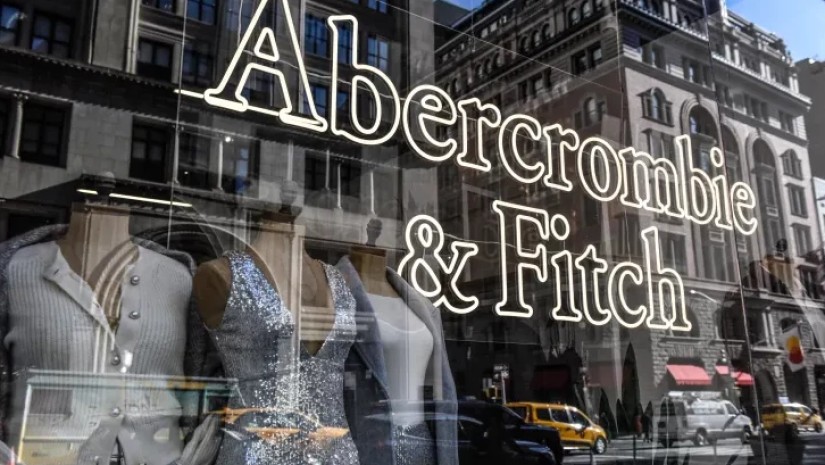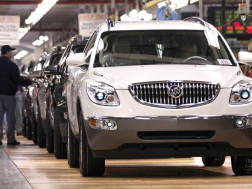Abercrombie & Fitch said Wednesday that its holiday-quarter sales jumped 21% and its profit grew thanks to higher prices and lower raw material costs.
The apparel retailer expects its growth story will continue as it issued better-than-expected sales guidance.
Here’s how Abercrombie did in its fiscal fourth quarter compared with what Wall Street was anticipating, based on a survey of analysts by LSEG, formerly known as Refinitiv:
* Earnings per share: $2.97 vs. $2.83 expected
* Revenue: $1.45 billion vs. $1.43 billion expected
The company’s reported net income for the three-month period that ended Feb. 3 was $158.4 million, or $2.97 per share, compared with $38.33 million, or 75 cents per share, a year earlier.
Sales rose to $1.45 billion, up about 21% from $1.2 billion a year earlier.
For the current quarter, Abercrombie expects sales to rise by a low double-digit percentage, compared with estimates of up 7.2%, according to LSEG. For the full year, its anticipates sales will grow between 4% and 6%, compared with estimates of 4%, according to LSEG.
Chief Financial Officer and Chief Operating Officer Scott Lipesky said on a call with analysts that he expects growth to be tempered in the second half of the year compared to the first.
“While we expect growth in both the first and second halves of the year, we expect the rate of growth will be higher in the first half, partially due to calendar shifts stemming from the 53rd week” in the fiscal 2023 calendar, said Lipesky. “We expect a full year operating margin around 12%.”
During the quarter, comparable sales grew 16% and gross margin came in at 62.9%, 7.2 percentage points higher than the year ago period. Higher average selling prices plus lower freight and raw material costs boosted profit. Analysts had expected Abercrombie’s gross margin to be 60.1%, according to StreetAccount.
Lipesky noted that cotton costs during the quarter were “relatively consistent” with 2022 levels. Going forward, he expects those lower input costs to make a “modest” improvement to its gross margin but any ongoing benefits from lower freight costs are expected to be offset by supply chain snags in the Red Sea.
“This is mostly an impact to the European market for us. A lot of shipping goes through that area. Our teams have been reading, reacting, changing modes, whenever they need to do to get the product here at the right time, at the best price,” said Lipesky.
“Obviously, we’ve seen – you’ve seen this, you’ve seen shipping rates elevate around the world as this has transpired, a little different by lane,” he added. “So, we are seeing some friction there on shipping costs. That’ll be more of kind of a Q2 into the back half thing as those higher shipping costs start to flow through.”
CEO Fran Horowitz said the company’s strong fourth quarter was fueled by growth “across regions and brands.”
“Abercrombie brands grew net sales 35%, continuing an impressive multi-quarter growth trend, while Hollister brands grew 9%, delivering a third consecutive quarter of sales growth,” said Horowitz.
“By staying close to our customers, tightly controlling inventories and continuing to operate with financial discipline, our team delivered year-over-year fourth quarter operating margin expansion of 800 basis points, reaching 15.3%,” she continued.
For the full year, Hollister brands, which includes Hollister and Gilly Hicks, grew 6%, compared to down 9% in the year-ago period.
“While we saw growth in both channels, stores outperformed digital, with around 70% of Hollister sales done in stores in 2023. The teen consumer tends to start their journey digitally, but more often finishes in the store,” said Horowitz.
At Gilly Hicks, the company has worked to transition the assortment from intimates and loungewear to more of an active lifestyle brand. Horowitz said the company still sees Gilly Hicks as a “key growth category” for the overall business, but it is planning to prioritize Abercrombie and Hollister in the near term because of the higher returns the brands bring. That means housing Gilly Hicks within the Hollister umbrella, which it has already been doing for some time, and closing most of its stores.
In the year ahead, Horowitz said the company is focused on expanding its global customer base and getting closer to reaching its long-term goal of $5 billion in global annual sales. During fiscal 2023, Abercrombie came close to that target, posting full-year revenue of $4.28 billion.
Abercrombie, once known for its heavily perfumed mall stores and shirtless models, has transformed into an inclusive lifestyle brand that traded screaming logos for quieter, refined styles that work for a variety of occasions and age groups.
With Horowitz at the helm, Abercrombie has redefined itself to the public and has harnessed the power of social media marketing and an army of influencers to win over a new generation of customers and woo back millennials who grew up with the brand.
Wall Street has been pleased with the transformation, which took off in earnest last year. At the start of 2023, its stock was trading around $23 a share, and by the end of the year, it had surged nearly 283% to $88.
So far this year, its stock is up about 59% as of Tuesday’s close.
As Abercrombie gears up to face tougher prior-year comparisons in the quarters ahead, it’s remaining optimistic.
In early January, Abercrombie raised its fourth-quarter and full-year outlook after holiday sales came in better than expected. It said it was expecting net sales to rise in the mid-teens and its operating margin to come in around 15% for the fiscal fourth quarter, compared with a previous outlook of low double-digit sales growth and a margin range of 12% to 14%.
At the time, Horowitz said Abercrombie & Fitch’s women’s business was expected to see its highest sales ever during the fourth quarter. She added that revenue in its men’s business, a growth driver for the company, had also climbed. Horowitz added the company’s Hollister brand was on track for higher profits as it focused on better merchandising and inventory management.
As investors look past the holiday season and into the spring and summer, they’ll be watching to see if Abercrombie can continue growing as consumers become increasingly cautious, especially when it comes to discretionary purchases like clothes.
Source: CNBC
















